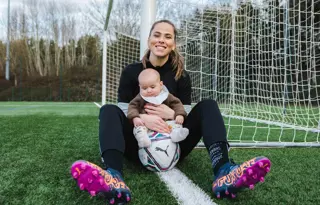News
Maternity and parental provisions in focus on latest #PlayersTalk

- In January 2021, minimum conditions agreed by FIFA, FIFPRO and other football stakeholders came into effect with regards to maternity rights
- Earlier this month, FIFA updated regulations on working conditions for professional women footballers
- Changing support for mothers in women’s football was discussed on a Space involving former internationals Helen Ward and Sif Atladottir, as well as FIFPRO Senior Legal Counsel Alexandra Gomez Bruinewoud
Maternity and parental provisions in professional women’s football were the focus of the latest #PlayersTalk, a Space hosted by FIFPRO on X (Twitter).
In January 2021, minimum conditions agreed by FIFA, FIFPRO and other football stakeholders came into effect with regards to maternity rights. The core rights that were granted to women's professional players were:
- The right to pregnancy without financial worries.
- The right to continue playing if healthy and the right to decide not to continue playing even if healthy.
- The right to paid maternity leave.
- The right to immediately return to play once the maternity leave is over and the player is healthy.
- The right to feed your baby during work hours in a suitable place.
On 1 June 2024, FIFA incorporated new regulations about working conditions for professional women footballers. They include a minimum of two, four or eight weeks’ leave for adoption and at least eight weeks for the partners of mothers in same-sex relationships, as well as a clause that encourages a family-friendly environment at federation level for players with children.
The changing support for mothers in women’s football was discussed on the Space hosted by former Wales international Helen Ward, who had her first child as a player in 2014 when motherhood was rare in women’s football.
"Before 2021, there were no international set of regulations that clubs and national teams had to follow," said Ward, Wales’ all-time leading scorer who is now General Manager of Watford Women.
"As players, it's really important we talk about what it was like before these regulations, now what it's like when it changes, and then what we would like to see in future."

Ward was joined on the Space by former Iceland defender Sif Atladottir, who had two children in a 12-year career with clubs in Germany, Sweden and Iceland.
"Previously most of us had to decide: are you going to have kids and then stop playing? It is crazy looking back to when I had my daughter in 2015, where it was up to the player and the club they were at, hoping that you had good credibility in your work as a player before to have an opportunity to play again," reflects Atladottir.
"When I was pregnant in 2014, I was at a good club with great coaches who had signed mothers in their first year after birth, so I knew I was in a good place. But it was tough when the contract finished and I ended up not signing a new contract until I was fit to start or be on the bench, which happened four and a half months after.
"A lot has changed, but that was the reality that we lived in. It is crazy to think that a simple thing as starting a family could end your career."

A landmark maternity case
In May 2022, Icelandic midfielder Sara Bjork Gunnarsdottir, represented by FIFPRO, became the first player to win a claim against a club through the FIFA Maternity Regulations.
The regulations entitled Bjork Gunnarsdottir – now at Juventus – to full payment throughout her pregnancy and until the start of her maternity leave when at former club Olympique Lyonnais.
Bjork Gunnarsdottir’s case showed that all players, even those at high-profile clubs, need protection. It also demonstrated how important it is to regulate minimums and not leave them to the goodwill of the parties.
"It was really sad to see what Sara went through," said Atladottir of her former international team-mate. "She kept it pretty close to the heart at the beginning. When we knew about the case, we obviously gave her all the support that we could.
"I'm so proud of her because just like the Bosman case was for the transfer market, Sarah Bjork has changed [the game] not just in women's football, but for all women athletes everywhere regarding this. It also shows even a big club like Lyon cannot drop the ball."

‘Men’s players should also have the right to paternity leave’
FIFPRO Senior Legal Counsel Alexandra Gomez Bruinewoud joined Ward and Atladottir on the Space. Gomez Bruinewoud helped draft FIFA’s first maternity regulations which came into effect in 2021 and were updated in June 2024.
Along with other FIFPRO lawyers, Gomez Bruinewoud negotiated on behalf of players the recent regulations which as of June 2024 are now part of the FIFA Regulations on the Status and Transfer of Players (RSTP).
"The problem we see is that FIFA’s regulations have not been fully implemented in every country. They should be implemented, this is mandatory according to FIFA, in each one of these 211 member associations and only some of them have done it," said Gomez Bruinewoud.

"New protections have been approved into the FIFA RSTP, protections that are very much welcomed by FIFPRO and were included in our initial draft that had been sent to FIFA back in 2020. This includes adoption leave and family leave.
"What is still missing? We would say all these protections regarding parental rights have been focused only on women’s players in FIFA's regulations. We deem that, of course, men’s players also have the right to paternity leave, to have paid time off to be with their new-born child.
"There is no clear justification, in our point of view, not to include professional men’s football players into these protections. And this should happen urgently in our view."
FIFPRO’s latest #PlayersTalk comes after March’s segment with Rangers and Nigeria defender Leon Balogun speaking about the impact of violence towards footballers in their workplace.
Listen back to the full audio of June’s episode HERE.
What’s it like to be a footballer and a parent?
— FIFPRO (@FIFPRO) June 17, 2024
Join @HelenWardie10, @SifAtla, and @AGomezFootball this Wednesday as they explore the challenges and progress in balancing parenthood with a football career.
🗓️ Weds 19 June
⏰ 14:00 CEST
🔗 https://t.co/IAUhzaCcOZ#PlayersTalk pic.twitter.com/SRBdys4rkS
